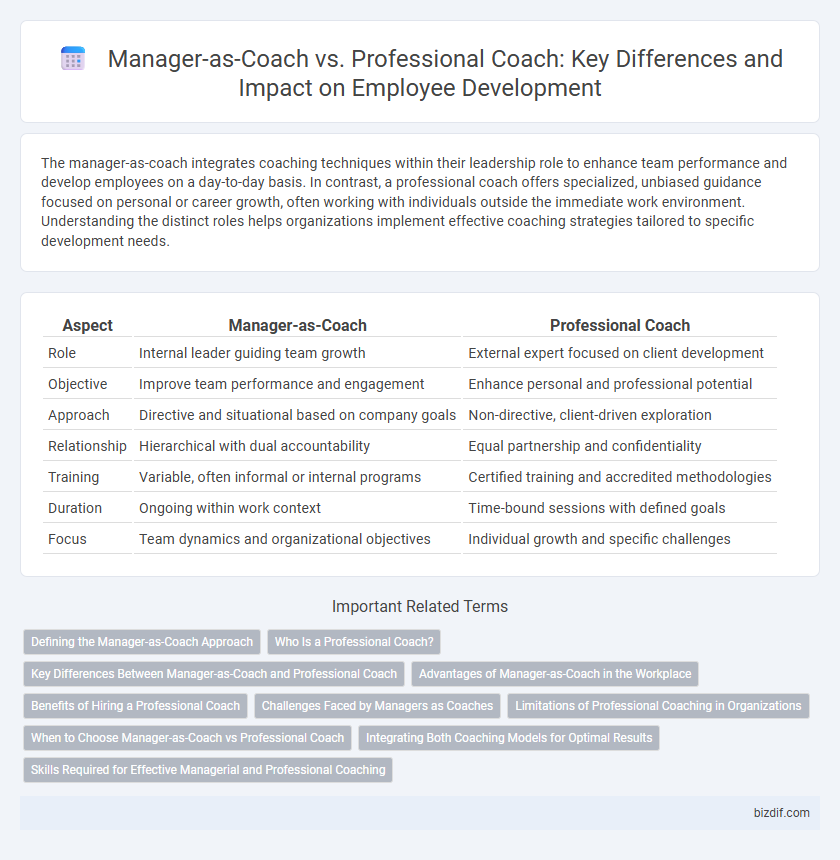The manager-as-coach integrates coaching techniques within their leadership role to enhance team performance and develop employees on a day-to-day basis. In contrast, a professional coach offers specialized, unbiased guidance focused on personal or career growth, often working with individuals outside the immediate work environment. Understanding the distinct roles helps organizations implement effective coaching strategies tailored to specific development needs.
Table of Comparison
| Aspect | Manager-as-Coach | Professional Coach |
|---|---|---|
| Role | Internal leader guiding team growth | External expert focused on client development |
| Objective | Improve team performance and engagement | Enhance personal and professional potential |
| Approach | Directive and situational based on company goals | Non-directive, client-driven exploration |
| Relationship | Hierarchical with dual accountability | Equal partnership and confidentiality |
| Training | Variable, often informal or internal programs | Certified training and accredited methodologies |
| Duration | Ongoing within work context | Time-bound sessions with defined goals |
| Focus | Team dynamics and organizational objectives | Individual growth and specific challenges |
Defining the Manager-as-Coach Approach
The Manager-as-Coach approach integrates coaching techniques into daily leadership, enabling managers to support employee growth while maintaining operational responsibilities. This approach emphasizes active listening, powerful questioning, and goal-setting to foster employee development within the organizational context. Unlike professional coaches, managers balance coaching with performance management and team oversight, creating a sustainable coaching culture.
Who Is a Professional Coach?
A professional coach is a trained expert specializing in facilitating personal and professional growth through evidence-based methodologies and certified coaching frameworks. Unlike a manager-as-coach who blends coaching with evaluative and supervisory roles, professional coaches maintain strict neutrality, focusing solely on the client's development without organizational bias. They are often accredited by recognized institutions such as the International Coach Federation (ICF) and employ goal-oriented strategies to unlock potential and enhance performance.
Key Differences Between Manager-as-Coach and Professional Coach
Manager-as-coach integrates coaching techniques within leadership to improve team performance, focusing on organizational goals and employee development through direct oversight. Professional coaches maintain an external, neutral stance with specialized training, emphasizing client-driven goals, personal growth, and long-term behavioral change. The key differences include scope of influence, relationship dynamics, and depth of coaching expertise between internal managers and external professionals.
Advantages of Manager-as-Coach in the Workplace
Manager-as-coach fosters stronger employee trust and engagement by providing personalized, on-the-spot feedback aligned with organizational goals. This approach leverages existing managerial relationships to enhance team performance and accelerates skill development through continuous, context-specific guidance. Embedding coaching into daily management reduces costs associated with external coaching services while promoting a culture of accountability and growth.
Benefits of Hiring a Professional Coach
Hiring a professional coach offers unbiased expertise and proven methodologies that enhance leadership skills and foster personal growth. Unlike a manager-as-coach, a professional coach provides confidential, objective feedback and tailors strategies to individual development needs. This focused approach accelerates performance improvement and drives sustainable organizational success.
Challenges Faced by Managers as Coaches
Managers acting as coaches often struggle with balancing their dual roles of authority and support, which can lead to conflicts in trust and openness during coaching conversations. Limited time and conflicting priorities further hinder their ability to provide consistent, high-quality coaching to team members. Unlike professional coaches who specialize solely in coaching competencies, managers may lack advanced coaching skills, reducing the effectiveness of their developmental impact.
Limitations of Professional Coaching in Organizations
Professional coaching in organizations often faces limitations such as restricted access due to high costs and limited availability of skilled external coaches. Confidentiality concerns and misalignment with organizational culture can hinder the effectiveness of external coaches in addressing internal challenges. Unlike manager-as-coach approaches, professional coaching may lack ongoing contextual understanding crucial for sustainable employee development.
When to Choose Manager-as-Coach vs Professional Coach
Choosing a manager-as-coach is ideal for ongoing development within a team, leveraging existing organizational knowledge and fostering immediate trust. Professional coaches provide unbiased expertise for complex challenges, leadership transitions, or when confidential, in-depth personal development is required. Assessing the need for neutrality, specialized skills, and long-term developmental goals determines the appropriate coaching approach.
Integrating Both Coaching Models for Optimal Results
Integrating the Manager-as-Coach and Professional Coach models enhances employee development by combining daily leadership insights with specialized coaching techniques. Managers provide continuous performance feedback and contextual guidance, while professional coaches offer deep expertise in goal setting and behavioral change. This synergy drives higher engagement, skill mastery, and long-term organizational success.
Skills Required for Effective Managerial and Professional Coaching
Effective managerial coaching requires strong interpersonal communication, emotional intelligence, and the ability to provide real-time feedback aligned with organizational goals. Professional coaches possess advanced listening skills, unbiased questioning techniques, and expertise in behavioral change methodologies to facilitate deep personal development. Both roles demand continuous skill enhancement, but professional coaches often rely on formal certifications and structured coaching frameworks to ensure efficacy.
Manager-as-coach vs professional coach Infographic

 bizdif.com
bizdif.com